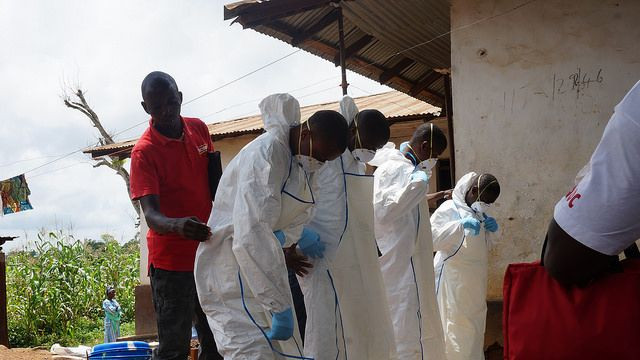As Ebola Outbreak Claims Record-Breaking 1,013 Lives, WHO Will Allow The Use Of Experimental Treatments

On Monday, the World Health Organization announced that experimental drugs can now be used on Ebola patients in Africa. The decision was made by a panel of WHO chosen experts who felt drugs may help to quell the most deadly Ebola outbreak in history. Under the compassionate use act, these treatments can now be made available to patients whose condition “has no comparable or satisfactory alternative treatment options.”
Mapp Biopharmaceutical’s experimental Ebola treatment, ZMapp, rose to international fame last month when it was used for the first time on American Ebola patients, Dr. Kent Brantly and Nancy Writebol. Later it was also used on Father Miguel Pajares, a Spanish priest who became infected while working with sick patients in Liberia. News of Brantly and Writebol’s health improvements gave hope that ZMapp may be successful in treating the viral hemorrhagic fever, but Pajares’ unfortunate death reminded doctors the experimental drug is far from a miracle cure. However, as the Ebola virus has now claimed over 1,000 lives, WHO ethics experts have agreed that these drugs may be the best chance victims have at recovery.
Although there is no cure or vaccine for the Ebola virus, many treatments are in various stages of development. The use of these experimental treatments is only being allowed because all other measures used to contain previous outbreaks have thus proved ineffective. “The magnitude and spread of the outbreak makes it that we don’t have enough people to rely only on what has traditionally worked if we want to stop the outbreak as quickly as possible,” Dr. Marie-Paule Kieny, the assistant director-general of the WHO, explained in a recent WHO press conference on Ebola ethics. Due to this, the organization announced in a recent press release that “it is ethical to offer unproven interventions with as yet unknown efficacy and adverse effects, as potential treatment or prevention."
The compassionate drug use act was first recognized by the Food and Drug Administration in 1987, and since then has been used as a way to treat critically ill patients. When using these unapproved medicines, it is extremely important that patients understand the possible risks. Kieny explained that consent would be obtained from a patient if conscious, and if unconscious, consent would be obtained from the patient's family or community leaders. “They should be explained that this drug has unproven efficacy and safety,” Kieny said. According to the WHO Assistant Director-General, there are “not 10 but more than three” antivirals for Ebola that have shown efficacy in primate studies, and two potential vaccines.
Although the availability of possible Ebola drugs is exciting, Kieny emphasized that “it is very important to not give false hope to anybody that Ebola can now be treated.” To her, this is “absolutely not the case.” Infection control, quarantine, and limitation of people’s movement are still the main focus of outbreak control. Still, the addition of a treatment or vaccine “would be a potent asset to counter the virus,” according to the WHO, and may just help to control the worst Ebola outbreak in world history.



























